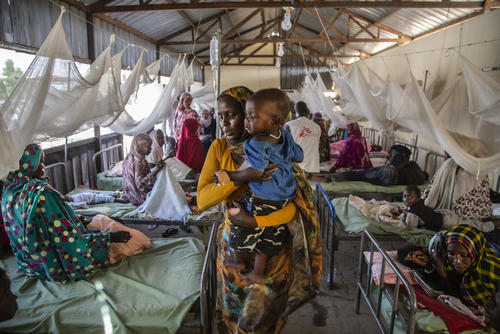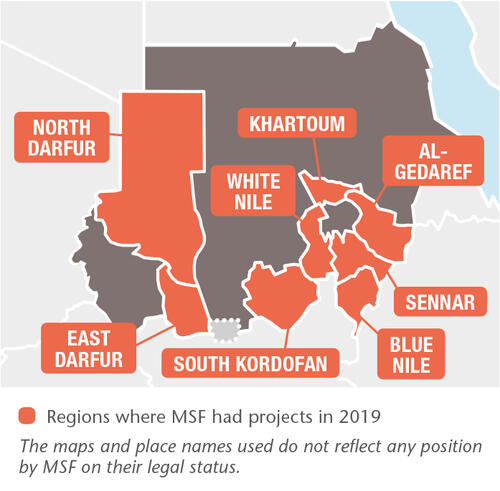
434,800
434,8
6,000
6,
1,680
1,68

570
57
The protests led to the ousting of President Omar al-Bashir in Sudan in April after nearly 30 years of rule and paved the way for a political transition, agreed between civilian and military representatives.
Needs remained great throughout the year, with nearly two million people internally displaced, a severely weakened health system and huge numbers of refugees, mostly South Sudanese stranded in the country for years after fleeing the civil war, living in precarious conditions.
Médecins Sans Frontières (MSF) reshaped some existing projects, launched assessments to start operations in different areas of the country and carried out frequent emergency interventions.
During the months of the protests, we treated people gathered in the crowded ‘sit-in’ area of the Sudanese capital for conditions such as dehydration. When clashes between demonstrators and security forces took place, our teams provided medical care and referred people to the main hospitals when necessary.
Other short-term interventions included addressing the needs of people affected by floods in Khartoum and White Nile states; and tackling outbreaks of disease, such as malaria in North Darfur state and cholera in Blue Nile, Sennar and Khartoum states.
MSF was the only international organisation directly supporting victims of violence during the protests in the emergency room of Khartoum’s largest hospital, Omdurman Teaching Hospital. The emergency intervention turned into a regular project by the end of 2019.
In Tawila, North Darfur, we handed over to the Ministry of Health and other organisations some of the activities that we have been running since 2007 to assist isolated communities and people affected by chronic conflict and displacement.
In East Darfur, we continued to run our health structure in Kario, a camp that hosts around 28,000 refugees from South Sudan. Our teams offer primary and secondary healthcare, such as maternity services and nutritional support for children. The services are also accessible for local residents living in the region.
South Sudanese refugees have also been the main focus of our operations in White Nile state for the past five years. By the end of 2019, there were still approximately 248,000 refugees living there, mostly in camps. In December, we opened a new 85-bed hospital in Kashafa camp, upgrading existing services, and handed over a smaller health facility in Khor Wharal camp. The upgraded facility treats patients with complicated conditions, including severely malnourished children and people with chronic infectious diseases, such as HIV and tuberculosis.
In Al-Gedaref, we maintained our diagnosis and treatment programme for kala azar (visceral leishmaniasis) and other neglected tropical diseases in Tabarak Allah hospital. In 2019, our teams also provided supervision and training to local health workers and Ministry of Health staff and organised awareness-raising campaigns. One of our teams contributed to scientific research by participating in a phase two, randomised, multicentric clinical trial.
In South Kordofan, in areas controlled by both governmental and by other armed groups, MSF continued to focus on sexual and reproductive health helping women and newborns affected by the humanitarian crisis in the region to obtain free, high-quality care and referrals for specialist services. Based in Dilling, support extends to other localities including Dalami and Habila.

















